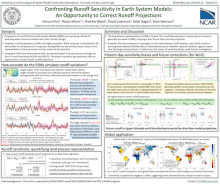Validation of recent runoff trends in Earth System Models
Hanjun
Kim
Department of Earth and Atmospheric Sciences, Cornell University, USA
Poster
Assessing water resource risks necessitates accurate projections of future runoff, a task increasingly reliant on Earth System Models (ESMs) in the context of climate change. However, the uncertainty in ESM runoff projections remains high, partly due to limited validation efforts. In this study, we address this gap by validating ESM runoff through a comparison of recent trends with observational data. Utilizing a machine learning-based global runoff reanalysis ensemble (GRUN-ENSEMBLE), we identify significant trends (1912-2011) in 29 out of 84 major global river basins. Strikingly, the runoff from the CMIP6 historical simulation fails to replicate even the direction of these observed trends. To uncover the sources of these discrepancies, we employ a multiple linear regression model to statistically emulate inter-annual variations in runoff based on temperature and precipitation variations, with its coefficients representing runoff sensitivity. This regression model successfully reproduces observed and simulated runoff trends. Notably, when incorporating observed precipitation variations and model-based sensitivities, the regression model accurately replicates observed runoff trends for most basins. This indicates the dominant influence of precipitation variations on recent runoff trends, underscoring the critical role of accurate precipitation projections in near-future water resource risk assessments. Nevertheless, temperature enhancements contribute equally to recent drying trends in selected river basins, such as the Nile, emphasizing the need for individualized basin assessments. Ongoing work involves a detailed comparison of observed and ESM-simulated trends in specific river basins where naturalized streamflow data is available.

Poster file
kim-hanjun-confronting-poster.pdf
(2.51 MB)
